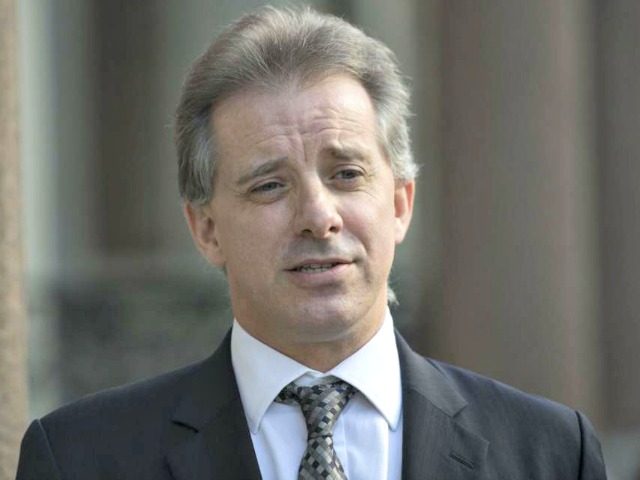NEW YORK — An extensive New Yorker profile details the information collection methods routinely used by Christopher Steele, the author of the infamous, largely discredited 35-page dossier on President Donald Trump.
The article relates that Steele’s firm pays “collectors,” at times including reporters, who gather information from unpaid sources. Some of those sources occasionally receive favors for their cooperation, such as help with getting their kids into Western schools.
New Yorker staff writer Jane Mayer reported:
To serve its clients, Orbis employs dozens of confidential “collectors” around the world, whom it pays as contract associates. Some of the collectors are private investigators at smaller firms; others are investigative reporters or highly placed experts in strategically useful jobs. Depending on the task and the length of engagement, the fee for collectors can be as much as two thousand dollars a day. The collectors harvest intelligence from a much larger network of unpaid sources, some of whom don’t even realize they are being treated as informants. These sources occasionally receive favors—such as help in getting their children into Western schools—but money doesn’t change hands, because it could risk violating laws against, say, bribing government officials or insider trading. Paying sources might also encourage them to embellish.
Steele is the founder of Orbis Business Intelligence, which was contracted by the controversial Fusion GPS to produce material related to Donald Trump’s 2016 presidential campaign. Fusion GPS was being funded for its anti-Trump work by Hillary Clinton’s 2016 presidential campaign and the Democratic National Committee (DNC) via the Perkins Coie law firm.
It was not clear whether Steele’s firm did any favors for the “sources” cited inside the dossier. The method would raise immediate questions as to the veracity of the information. While the New Yorker reported generally that “money doesn’t change hands,” Steele has not commented about whether any of the dossier sources were paid.
One “source” cited in the Fusion GPS document is a “senior Russian Foreign Ministry figure” – meaning an individual who purportedly served in the Russian Foreign Ministry at the time the dossier was produced. If the source is not fabricated, he or she may still be serving in the Russian government. Another quoted “source” was “a former top-level intelligence officer still active inside the Kremlin.”
In testimony released publicly in January, Fusion GPS Co-Founder Glenn Simpson claimed that he did not know whether Steele paid any of his purported sources.
When asked about any payments to sources, Simpson responded:
I don’t know. I think there’s been a little bit of confusion I would like to clear up. Some people were saying that he was paying people for information. I don’t know whether he does or not, but that’s not basically how I understand field operations to work. You commission people to gather information for you rather than sort of paying someone for a document or to sit for an interview or something like that. That’s not how I understand it works.
Former acting CIA Director Michael Morell, who currently works at the Hillary Clinton-tied Beacon Global Strategies LLC, previously revealed that he “learned” that Steele paid some of the purported sources cited in the dossier.
Morell serves as senior counselor at Beacon Strategies. Beacon was founded by Phillippe Reines, who served as Communications Adviser to Hillary Clinton while she was secretary of state. From 2009-2013, Reines also served in Clinton’s State Department as the Deputy Assistant Secretary of State for Strategic Communications. Reines is the managing director of Beacon.
NBC News reported on comments made by Morell at an event last March sponsored by the Cipher Brief intelligence website.
“I had two questions when I first read it,” Morell stated of Steele’s dossier for Fusion GPS. “One was, How did Chris talk to these sources? I have subsequently learned that he used intermediaries.”
Morell then made the comments about Steele allegedly paying his purported sources.
Morell stated: “And then I asked myself, why did these guys provide this information, what was their motivation? And I subsequently learned that he paid them. That the intermediaries paid the sources and the intermediaries got the money from Chris.
“And that kind of worries me a little bit because if you’re paying somebody, particularly former FSB [Russian intelligence] officers, they are going to tell you truth and innuendo and rumor, and they’re going to call you up and say, ‘Hey, let’s have another meeting, I have more information for you,’ because they want to get paid some more.
“I think you’ve got to take all that into consideration when you consider the dossier.”
Besides Morell’s comments, Vanity Fair last March published an extensive article on the origins of the dossier that reported Steele had a history of paying sources.
The article stated:
And so, as Steele threw himself into his new mission, he could count on an army of sources whose loyalty and information he had bought and paid for over the years. There was no safe way he could return to Russia to do the actual digging; the vengeful FSB. would be watching him closely. But no doubt he had a working relationship with knowledgeable contacts in London and elsewhere in the West, from angry émigrés to wheeling-and-dealing oligarchs always eager to curry favor with a man with ties to the Secret Service, to political dissidents with well-honed axes to grind.
Aaron Klein is Breitbart’s Jerusalem bureau chief and senior investigative reporter. He is a New York Times bestselling author and hosts the popular weekend talk radio program, “Aaron Klein Investigative Radio.” Follow him on Twitter @AaronKleinShow. Follow him on Facebook.
Joshua Klein contributed research to this article.

COMMENTS
Please let us know if you're having issues with commenting.